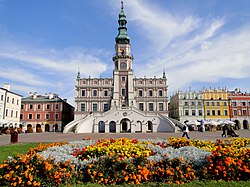
The following outline is provided as an overview of and topical guide to tourism:
Contents
- What type of thing is tourism?
- Types of tourism
- History of tourism
- Tourism support services
- Hospitality industry
- General tourism concepts
- Tourism organizations
- Tourism media
- Tourism publications
- Persons influential in tourism
- See also
- References
- External links
Tourism – travel for pleasure or business; also the theory and practice of touring, the business of attracting, accommodating, and entertaining tourists, and the business of operating tours. [1] Tourism may be international, or within the traveller's country. The World Tourism Organization defines tourism more generally, in terms which go "beyond the common perception of tourism as being limited to holiday activity only", as people "traveling to and staying in places outside their usual environment for not more than one consecutive year for leisure, business and other purposes". [2]